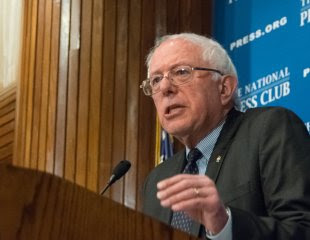
The well-being and political interests of African-Americans are routinely sacrificed on the mantle of political expediency in the United States.
To wit. During an interview last week, Democratic presidential candidate Bernie Sanders made a declarative statement about reparations for the descendants of those many millions of black Americans whose lives, labor, blood, inventions and other property were stolen by centuries of bondage in the United States, and across the Black Atlantic:
No, I don’t think so. First of all, its likelihood of getting through Congress is nil. Second of all, I think it would be very divisive. The real issue is when we look at the poverty rate among the African American community, when we look at the high unemployment rate within the African American community, we have a lot of work to do.
So I think what we should be talking about is making massive investments in rebuilding our cities, in creating millions of decent paying jobs, in making public colleges and universities tuition-free, basically targeting our federal resources to the areas where it is needed the most and where it is needed the most is in impoverished communities, often African American and Latino.
Sanders’ comment is another chapter in a long-running and still ongoing debate among liberals and progressives about the relationship between race and class. As the late Stuart Hall, the essential scholar of the global color line, so incisively observed, race is:
“the modality in which class is ‘lived,’ the medium through which class relations are experienced, the form in which it is appropriated and ‘fought through’.”
In all, Bernie Sanders’ comment signals to an old fight, one that apparently is no closer to being resolved.
Americans, because of their country’s specific historical relationship between capitalism, slavery, a relatively weak bureaucracy, limited to no history of feudalism, Westward expansion, empire, and political culture more generally, are still struggling with how race and class inform one another. This leads to persistent questions such as, should we focus on class with the hope that “all boats will float across the color line”? Alternatively, should a true, full, equal and expansive democracy first focus on the specific and particular harms done to people of color precisely because of how racism and white supremacy impact citizenship and life opportunities in the United States?
Sanders’ claim that reparations for African-American enslavement would be “very divisive” is also one that can be empirically evaluated. It is not a mystery. Ultimately, Sanders’ beliefs about slavery reparations and white public opinion need not be exiled to the fuzzy logic of mere opinion.
Professor Michael Dawson is one of the foremost experts on American public opinion, the color line and reparations for African-American slavery.
In his 2004 article “Reparations: Justice and Greed in Black and White,” Michael Dawson (along with co-author Rovana Popoff) clearly demonstrates that Bernie Sanders’ observation that slavery reparations, as paid to black Americans for the stolen wealth, income and labor of their ancestors in the past and near present by the United States government (and other actors) is extremely controversial.
As Dawson described in an interview with Harvard Magazine:
An even larger majority of blacks (79 percent) supported an apology to African Americans, although even fewer whites (30 percent) did so, opening up a huge “race gap” of 49 percentage points. Regarding monetary reparations to descendents of slaves, two out of three blacks voiced support, against a mere sliver (4 percent) of the white respondents, creating a racial gulf of 63 points.
“These numbers are relatively shocking by any standard,” says Dawson. “When we talk about gender gaps in American politics, we’re talking about gaps of 5 to 15 percent. Here we’re talking about gaps of the order of 50 to more than 60 percent.” Deeply polarized perceptions of racial equality (or its lack) are a major factor underlying the overwhelming disparities. While a majority of white respondents (64 percent) thought that blacks had achieved or would soon achieve equality, an even larger majority (78 percent) of blacks believed the opposite: that African Americans would not achieve racial equality in their lifetimes, or that they would never achieve equality…
Racial politics, in fact, trump all other factors — age, gender, education, and political party — affecting support or opposition to federal reparations. Among whites, affluence and education do not mean a more liberal stance. Although slightly more white women than white men support an apology for World War II internment, white men and women of all backgrounds almost unanimously (96 percent) oppose monetary reparations for slavery… What most surprises Dawson is the hostility he and other academics encounter when they discuss these issues in public. “I’m surprised by how visceral a reaction this issue provokes, even when people present the arguments neutrally,” he says. “It’s very easy for opponents to dismiss the other side out of hand.”
Reparations for harms done to a people because of their race, ethnicity, religion or other markers of difference are not bizarre or unusual justice claims. They have firm standing under international law as has been seen with survivors of the Holocaust, in some limited cases with First Nations peoples in the United States and other countries, Japanese Americans during World War II, and victims of political violence in Latin America, Brazil, South Africa and elsewhere,
While public opinion research is clear that white Americans are extremely hostile to reparations for slavery in the case of African-Americans, many white Americans actually support the idea of reparations in the abstract.
Ohio State University psychologist Philip Mazzocco conducted the following experiment:
One issue with the previous scenario is that participants may minimize the disparities they would face as a black person, because they had always passed as white. So in one study, whites were told to imagine that they were about to be born as a random white person in America, but they were being offered a cash gift to be born as a random black person. Once again, white participants requested relatively small sums to make a life-long race-change. In addition, some were given a list of some of the costs of being black in America, such as the racial wealth disparity. The result was that whites in this latter scenario requested significantly higher amounts than those in the previous studies – about $500,000.
Finally, some participants were given a similar scenario except all references to blacks, whites and America were taken out. They were asked to imagine they were born into the fictional country of Atria, and were born either into the “majority” or “minority” population. They were given a list of the disadvantages that the minority population faced in Atria (which were identical to the real disadvantages faced by blacks in America). In this case, white participants in the study said they should be paid an average of $1 million to be born as a minority member in Atria.
“When you take it out of the black-white context, white Americans seem to fully appreciate the costs associated with the kinds of disparities that African Americans actually face in the United States,” Mazzocco said. “In this case, they asked for a million dollars, similar to what they want for giving up television.”
Mazzocco said blatant prejudice was not the reason for the findings. Results showed that whites who scored higher on a measure of racial prejudice did not answer significantly differently than others in the study.
This is a very important wrinkle. It is not that white Americans necessarily reject the idea of reparations as an abstract norm or principle; Mazzocco’s work would seem to suggest that they reject the reality of the harms and cost associated with being black in America in particular.
Why is this?
General levels of white racial resentment and anti-black affect are highly predictive of white hostility to reparations for black Americans. The many myths that cohere to create “American Exceptionalism” also contribute to the extreme resistance by many white Americans to acknowledging the real harms done to black Americans that can be traced back to slavery, through to Jim and Jane Crow, and into the present. The stolen land, labor and lives that built white America’s empire and fortunes to the disadvantage of black Americans (black slaves were the most valued capital good in the United States) were not erased by Emancipation, the civil rights movement, or the election of Barack Obama. Housing segregation, discrimination in the labor market, racism in the criminal justice system, and wealth and income inequality where white Americans have many times more assets and resources than African-Americans can be traced back to the country’s original sin of white on black chattel slavery.
And while white ethnic immigrants retreat to the color-blind white supremacist redoubt and lie of “we never owned slaves,” they too benefited from a system of racial hierarchy that brought white “ethnics” into Whiteness via their complicity with anti-black racism, and subsequently buying into the racial spoils system that is white privilege. This system of white racial spoils extends even to the white poor, as even that cohort, while struggling, as detailed in the book “Black Wealth/White Wealth,” still holds more wealth and other resources than black Americans who are much higher in the income and employment scale.
The stories that (white) Americans tell themselves about individualism, the myth of meritocracy and democracy itself, are all complicated and severely undermined by chattel slavery and the United States’ founding as a white racist settler society where citizenship (and inclusion) was defined by white dominance over non-whites. For this and many other reasons, White America’s collective imagination rejects such complications in favor of a far simpler—and more comforting—narrative.
These explanations are all correct. But, I would suggest that the most basic reason for white Americans’ hostility to slavery reparations for black Americans is far more instrumental and personal. Social scientists have shown that many white Americans view racism as a “zero sum game.” If there has to be a “winner” and a “loser” then acts of restorative and/or redistributive justice along the color line that involve material resources are viewed as acts of “stealing” or “theft” from the “deserved” earnings or wealth of white people.
Americans pay taxes that subsidize the rich, the oligarchs, huge corporations that export jobs, white welfare rancher land thieves like the Bundy Brigands in Oregon and Nevada, weapons manufacturers, and others who are parasites on the Common Good. In response, there is relatively little protest by broad swaths of the white public. Moreover, with little complaint or protest, the “submerged state” is a system that overwhelmingly subsidizes the white middle and upper classes.
However, the very idea that a specific black person (and a cousin to this logic extends to the poor, single mothers on welfare, the homeless, the unemployed, or others who make use of the minimal social safety net that exists in the United States) could possibly receive money for a crime done to their ancestors (or to them personally in the present on an institutional level) is unthinkable, a notion that is anathema to so-called American values.
In his critique of Bernie Sanders’ rejection of slavery reparations for black Americans, Ta-Nehisi Coates is absolutely correct: Sanders is able to show political vision and embrace policy solutions that many Americans believe are “impractical” or “unthinkable,” yet he somehow becomes a shrewd and calculating pragmatist who considers “reparations” as “divisive” and politically impractical.
Bernie Sanders is also correct. Reparations for the enslavement of black Americans is politically untenable and yes, extremely “divisive.”
Both Coates and Sanders remind us, in their own ways, that if American politics is a version of chess, then African-Americans are the pawns … and the pawn is the most powerful piece on the board. Unfortunately, because African-Americans are a pawn in a game of political chess they are often the first to be sacrificed. This is not a necessity in the history of American political development. It is a choice.














